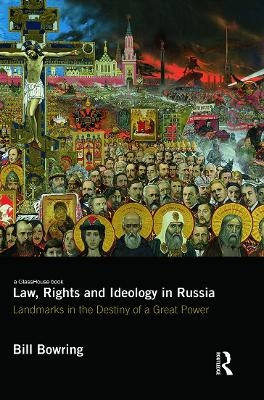
Law, Rights and Ideology in Russia
Routledge (Verlag)
978-0-415-68346-3 (ISBN)
Law, Rights and Ideology in Russia: Landmarks in the destiny of a great power brings into sharp focus several key episodes in Russia’s vividly ideological engagement with law and rights. Drawing on 30 years of experience of consultancy and teaching in many regions of Russia and on library research in Russian-language texts, Bill Bowring provides unique insights into people, events and ideas.
The book starts with the surprising role of the Scottish Enlightenment in the origins of law as an academic discipline in Russia in the eighteenth century. The Great Reforms of Tsar Aleksandr II, abolishing serfdom in 1861 and introducing jury trial in 1864, are then examined and debated as genuine reforms or the response to a revolutionary situation. A new interpretation of the life and work of the Soviet legal theorist Yevgeniy Pashukanis leads to an analysis of the conflicted attitude of the USSR to international law and human rights, especially the right of peoples to self-determination. The complex history of autonomy in Tsarist and Soviet Russia is considered, alongside the collapse of the USSR in 1991. An examination of Russia’s plunge into the European human rights system under Yeltsin is followed by the history of the death penalty in Russia. Finally, the secrets of the ideology of ‘sovereignty’ in the Putin era and their impact on law and rights are revealed. Throughout, the constant theme is the centuries long hegemonic struggle between Westernisers and Slavophiles, against the backdrop of the Messianism that proclaimed Russia to be the Third Rome, was revived in the mission of Soviet Russia to change the world and which has echoes in contemporary Eurasianism and the ideology of sovereignty.
Bill Bowring is Professor of Law at Birkbeck College, University of London, where he teaches human rights, public international law and minority rights. He is also a practising barrister specialising in human rights, since 2000 representing applicants against Russia and other post-Soviet states at the European Court of Human Rights. He has taught at a number of Russian universities and has worked as a consultant with DFID, the EU, Council of Europe, and the OSCE’s High Commissioner on National Minorities.
Introduction 1.Theorising Russia's ideological history 2. The Scottish Enlightenment in the Russian Empire 3. The 1850s and 1860s in Russia: revolutionary situation or great reforms? 4. The trajectory of Yevgeniy Pashukanis and the struggle for power in Soviet law 5. Soviet international law and self-determination 6. The collapse of the USSR and the 'parade of sovereignities' 7. Russian autonomy 8. Human Rights in the Yeltsin period 9. Russia and the death penalty 10. Sovereign democracy Conclusion
| Erscheint lt. Verlag | 5.4.2013 |
|---|---|
| Zusatzinfo | 7 Tables, black and white |
| Verlagsort | London |
| Sprache | englisch |
| Maße | 156 x 234 mm |
| Gewicht | 620 g |
| Themenwelt | Geisteswissenschaften ► Geschichte ► Regional- / Ländergeschichte |
| Recht / Steuern ► Allgemeines / Lexika | |
| Recht / Steuern ► Arbeits- / Sozialrecht ► Sozialrecht | |
| Recht / Steuern ► EU / Internationales Recht | |
| Recht / Steuern ► Öffentliches Recht ► Völkerrecht | |
| Sozialwissenschaften ► Politik / Verwaltung | |
| Sozialwissenschaften ► Soziologie ► Spezielle Soziologien | |
| ISBN-10 | 0-415-68346-7 / 0415683467 |
| ISBN-13 | 978-0-415-68346-3 / 9780415683463 |
| Zustand | Neuware |
| Haben Sie eine Frage zum Produkt? |
aus dem Bereich


